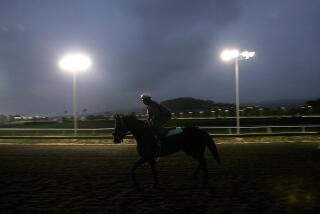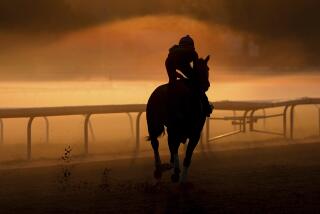24-Hour Racing Network Looks Like a Real Loser
When the Television Games Network, a 24-hour channel devoted to horse racing, made its debut last week, there was one moment that perfectly demonstrated the philosophy behind the new venture. A race had been run, and the results were official, but host Ken Rudulph chose not to announce the payoffs right away.
Instead, he opened a daily newspaper. “Before we check out the results,” he said, “I’ve got to check out my horoscope . . . “ And he proceeded to read the forecast for Libra that promised “success in financial matters.”
A viewer would have been annoyed if he was waiting to find out what his exacta paid, but such hardcore bettors are not TVG’s principal audience. Instead, the network wants to attract new fans with a presentation that is hip, entertaining and unconventional.
The thoroughbred industry is betting heavily that this approach will succeed. The National Thoroughbred Racing Association has allied itself with TVG, and many of the country’s most important tracks have signed exclusive deals with the network. TVG plans to offer interactive wagering via the television screen and to operate its own telephone betting system. It aims to become a major force in the sport.
Although TVG’s first shows are being beamed only to Kentucky and to subscribers of a largely rural satellite dish system, everyone in the business is paying close attention to TVG’s operations. And its first shows received worse reviews than a Kathie Lee Gifford Christmas special. Harness-racing executive Stan Bergstein wrote in the Daily Racing Form that it was a “tasteless travesty,” and theorized: “Executive producer Ton Allevato . . . presumably feels a three-ring circus, complete with clown acts, is the way to [create] racing fans and reach generation X.”
I expected to be slightly annoyed by TVG, because as a serious player I would prefer a no-frills telecast. But we horseplayers should be able to endure some banter from the hosts; maybe we can tolerate TVG’s plan to show only four or five races an hour, forcing it to omit some races from a track’s card. But people betting their money demand a dependable flow of information, and TVG does not seem interested in delivering it.
When TVG displayed the entries for the second race at Belmont, the screen showed that a horse named Heavyweight was scratched. Commentator Matt Carothers didn’t have a record of the scratch, and he said, “That must be a late scratch, my friend.” Rudulph said: “We’ll wait to see if that’s official.”
Viewers waited, all right--waited until after TVG had aired a couple of commercials and a feature on a racetrack bugler. Several minutes later the announcers came back to say that, no, Heavyweight, wasn’t scratched. In fact, he was the 4-to-5 favorite.
The third race at Belmont was the start of the pick six, an allowance event featuring the top stakes horse Dice Dancer. However, this was a race that TVG had arbitrarily decided that it wouldn’t show. TVG never informed its viewers that it was skipping the race. Its hosts never mentioned the race or gave the results. What horseplayer could watch a presentation like this?
Even if the flow of information were more dependable, many horseplayers would be driven to distraction by the incessant, mindless chatter of the hosts. Although TVG’s aim is to be young and hip, it’s often simply immature and inane--particularly when Todd Schrupp and Claudia Simon are on the screen. During one stretch on their maiden telecast they chattered for 3 1/2 minutes without mentioning horses--about the rock group Bananarama, about Brandi Chastain, about the fact that Claudia had written an article for some obscure magazine--the only evidence of the host’s literacy. Finally, when a harness race from Maywood Park was about to start, Schrupp quizzed his partner: “Race 3 from Maywood, and that’s where?” Simon: “I don’t know, actually.” Schrupp: Maywood, Race 3, in Illinois.”
At least the Schrupp-Simon partnership can’t get any worse. It has already reached its nadir when Schrupp made a pick in a race, as follows: “I’m going for No. 5, Lucky Anna, because next week will mark the ninth anniversary of me losing my virginity--and her name was Anna.”
The whole idea of this approach is to be different, to capture a new audience. TVG vice president Rick Baedeker said that research shows that racing “is not a part of the consciousness of Americans” and TVG is trying to grab their attention. But I don’t comprehend what is supposed to happen next. A channel-surfer watches Rudulph read his horoscope or Schrupp talk about his loss of virginity or sees a feature that begins: “This is a story of a dog’s life--and a dog’s near death--at Hollywood Park.” What alchemy transforms that viewer into someone who wants to learn how to handicap, bet on the races and open a telephone-wagering account with TVG?
I don’t believe the alchemy is going to happen, and TVG’s big venture may turn into a losing parlay. It may fail to attract new fans while at the same time repulsing the bettors who are the sport’s core customers.
More to Read
Go beyond the scoreboard
Get the latest on L.A.'s teams in the daily Sports Report newsletter.
You may occasionally receive promotional content from the Los Angeles Times.










